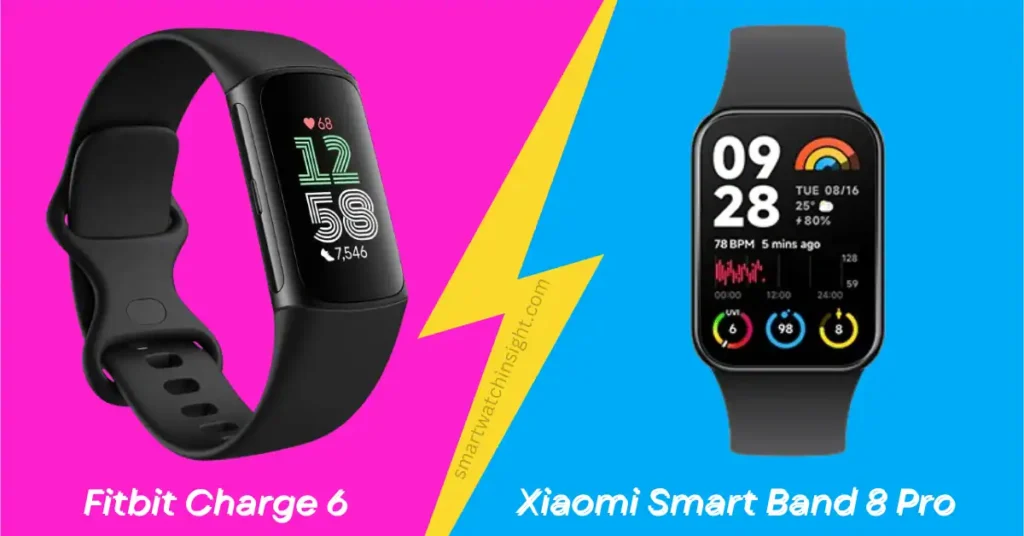Looking for a fitness tracker to help you stay on top of your health goals? Both the Fitbit Charge 6 and Xiaomi Smart Band 8 Pro are excellent options, but they cater to slightly different needs.
This guide will break down the key differences between the Charge 6 and the Band 8 Pro, helping you pick the perfect match for your needs. Whether you’re a budget-conscious beginner or a fitness enthusiast seeking advanced features, we’ll help you find the tracker that best complements your lifestyle and keeps you motivated on your health journey!
Let’s break down their key features to help you pick the perfect champion for your wrist!
Xiaomi Smart Band 8 Pro vs Fitbit Charge 6 Spec
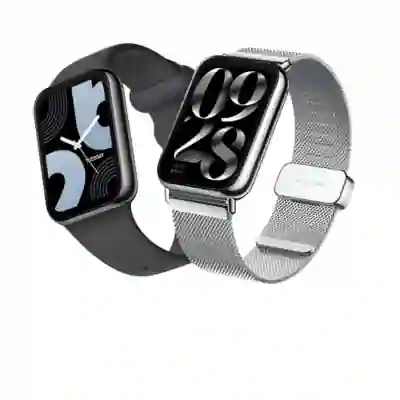 | 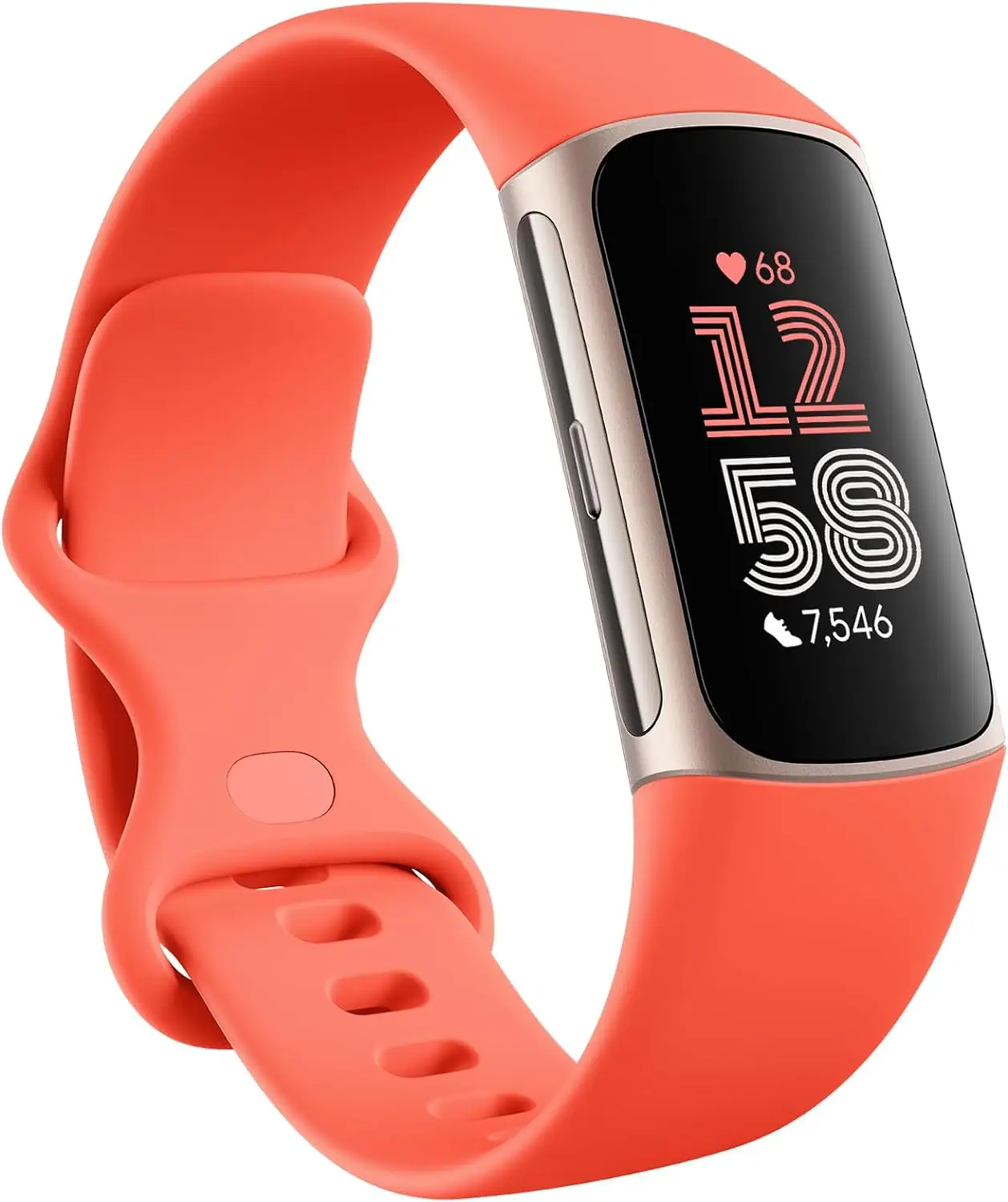 | |
| Feature | Xiaomi Smart Band 8 Pro | Fitbit Charge 6 |
|---|---|---|
| Display | 1.74-inch AMOLED | 1.04-inch AMOLED |
| Navigation | Touchscreen | Physical button |
| Battery Life | Up to 14 days (normal use), 4-7 days (typical use) | Up to 7 days (always-off display), 3-4 days (always-on display) |
| Charging Time | Approximately 1 hour | Approximately 2 hour |
| Battery type | Lithium-ion polymer | Lithium-polymer |
| GPS | Yes | Yes |
| Heart Rate Monitoring | Yes | Yes |
| ECG Sensor | No | Yes |
| EDA Stress Sensor | No | Yes |
| Sleep Tracking | Yes | Yes |
| Women’s Health Features | Yes | Yes |
| Blood Oxygen Monitoring | Yes | Yes |
| Workout Modes | Over 150 | Over 40+ |
| Water Resistance | 5 ATM | 5 ATM |
| Smart Features | Limited (notifications) | Google Maps, Google Wallet, YouTube Music control |
| Customization | Wide variety of additional bands | Fewer band options |
| Operating System | Android 8.0 or iOS 12.0 and above | iOS 15 & Android OS 9.0 or higher |
| Compatible Apps | Mi Fitness app | Fitbit app |

Fitbit Charge 6 Best Over All
Read Review:- Fitbit Charge 6 Review
Design and Display
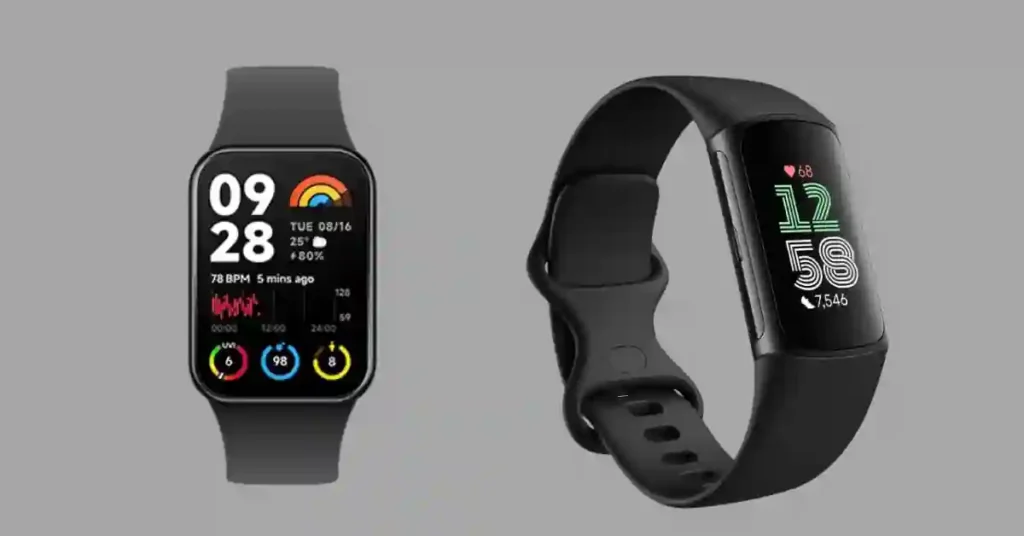
The design and display of a fitness tracker play a significant role in user experience. The Xiaomi Smart Band 8 Pro strikes a balance between a traditional fitness tracker and a smartwatch.
Boasting a 1.74-inch AMOLED display, it provides superb clarity even in bright sunlight. The larger screen enhances the viewing experience for statistics and notifications without being cumbersome.
The dimensions of 46mm (H) x 33.35mm (W) x 9.99mm (D) ensure a unisex appeal suitable for various wrist sizes. Weighing in at 22.5g (without the strap) or 37g with it, the device remains comfortable during activities and sleep tracking.
While the default appearance may not be the most premium, Xiaomi offers a wide range of additional bands, including metal or leather options designed for formal settings.
In contrast, the Fitbit Charge 6, despite being double the price, doesn’t bring a significant upgrade in design quality or customization. With a 1.04-inch AMOLED display, it caters to those who prefer a smaller footprint.
The overall dimensions of 36mm x 23mm x 11mm make it a more suitable option for individuals with smaller wrists or those who dislike wearing a watch.
The device’s design lacks the versatility of the Band 8 Pro but compensates with a navigation-friendly button, providing ease of use.
Health & Fitness Tracking Features
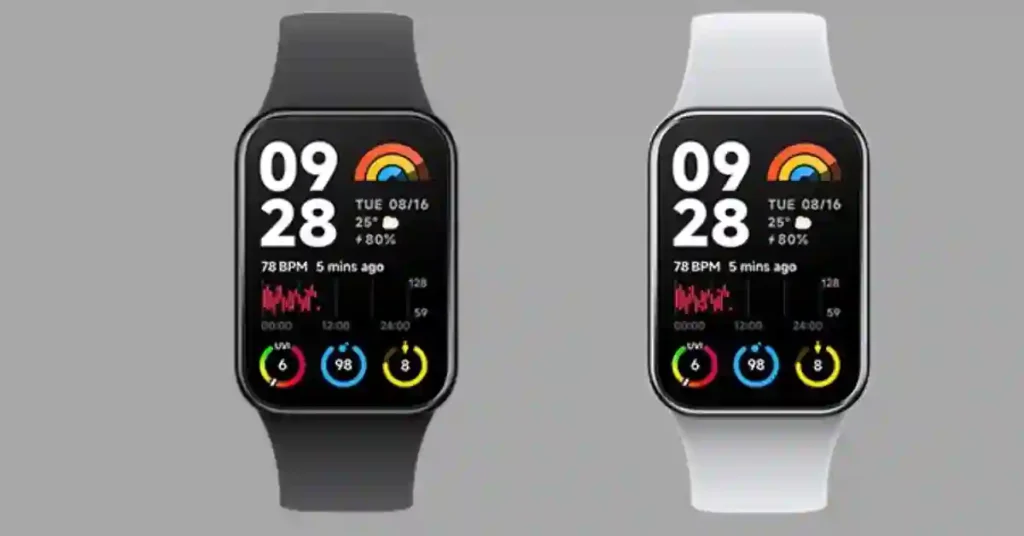
When it comes to fitness tracking and health features, both devices offer an array of functionalities, yet they differ in their execution.
The Xiaomi Smart Band 8 Pro impresses with GPS tracking, support for over 150 tracking modes, advanced training analysis, all-day stress monitoring, sleep insights, women’s health features, and blood oxygen saturation readings.
Despite the extensive feature list, the device falls short of accuracy compared to industry leaders like Apple, Garmin, and Fitbit.
While it might not match gold-standard precision, it serves as an excellent starting point for casual insights into one’s health and fitness journey, especially given its remarkable value for the price.
Conversely, the Fitbit Charge 6 mirrors many of the Smart Band 8 Pro’s features, offering a few key insights exclusively for Fitbit Premium members. Its standout feature lies in outstanding sleep tracking, rivalling competitors like Oura Ring.
However, a notable flaw in design hinders its performance. The device faces a GPS/HR problem, where, if worn normally, the GPS struggles to connect. Conversely, if worn loosely for GPS functionality, the optical heart rate becomes effectively redundant.
This design flaw compromises the device’s reliability despite its generally superior tracking capabilities for stress, heart rate, steps, GPS, VO2 Max, and ECG. The Fitbit app provides an exceptional user experience, standing out in the fitness tracking realm.
Smart Features
Smart features contribute significantly to the overall appeal of fitness trackers, and here, the Xiaomi Smart Band 8 Pro and Fitbit Charge 6 showcase distinctive capabilities.
The global edition of the Smart Band 8 Pro lacks some smart features found in the Chinese model, including support for contactless payments. While it covers the basics, like notifications, quite well, it falls short in providing access to third-party apps or services.
Music support is limited to controlling playback on the connected phone, and untethering from the phone while staying connected is not an option.
In contrast, the Fitbit Charge 6, backed by Google, elevates the smart experience. While not reaching the level of a full-fledged smartwatch, it offers basic apps such as Google Maps for turn-by-turn directions, Google Wallet for contactless payments, and YouTube Music for streaming.
Similar to Xiaomi’s tracker, it cannot make calls over Bluetooth or include safety features. However, it compensates with the ability to mirror notifications from Android/iOS to the wrist. The user interface (UI) proves to be less buggy than Xiaomi’s tracker, enhancing the overall smart functionality.
Xiaomi Band 8 Pro vs Charge 6 Battery Life
Battery life is a critical consideration for users seeking a fitness tracker that can keep up with their daily activities without frequent charging.
The Xiaomi Smart Band 8 Pro impresses with an estimated battery life of up to 14 days in normal use, a notable improvement from the Band 7 Pro’s 12 days.
However, utilizing the always-on display reduces this estimation to around six days. While Xiaomi’s projections generally align with real-world usage, achieving the maximum battery life may require turning off some features.
In practical terms, most users can expect the tracker to last between 5 to 7 days, still a commendable duration given the extensive features running on a relatively large display.
On the other hand, the Fitbit Charge 6 hasn’t made substantial strides in battery life compared to its predecessor. With the always-on display disabled, users can expect around a week of usage.
Enabling this feature shortens the battery life to approximately 3 to 4 days. Fitbit doesn’t include a quick charge feature similar to its smartwatches, meaning it takes about two hours to charge from flat to 100%.
While the Charge 6 doesn’t rank as the worst-performing fitness tracker in terms of battery life, it doesn’t match the impressive longevity of Xiaomi’s device in this area.
Price and Availability
Understanding the price, availability, and competition of these fitness trackers is crucial when making a decision. The Fitbit Charge 6, priced at $160, positions itself as a more premium option in the market.
Despite facing competition from other well-known brands, its price reflects the brand’s reputation and advanced features. On the other hand, the Xiaomi Smart Band 8 Pro, with a more budget-friendly tag of $75, presents an attractive alternative.
However, its official unavailability in the US may impact accessibility for potential buyers. Both devices adhere to simplicity, offering a single size and no additional variations.
Verdict
Having spent time with both the Xiaomi Smart Band 8 Pro and Fitbit Charge 6, considering their distinct strengths and weaknesses is crucial for potential buyers. The choice between the two depends on individual priorities and preferences. Here are the recommended scenarios for choosing either device:
Choose the Xiaomi Smart Band 8 Pro if:
- You prioritize excellent value in a fitness tracker.
- You can tolerate sub-optimal accuracy for casual insights.
- You appreciate a versatile, unisex design.
- Customizability with various band options appeals to you.

Xiaomi Smart Band 8 Pro
Choose the Fitbit Charge 6 if:
- You value support for Google apps in your fitness tracker.
- Top-notch sleep tracking is a priority.
- You don’t rely heavily on GPS or heart rate accuracy.
- A user-friendly button navigation is preferable to touch controls.

Fitbit Charge 6
In conclusion, your ideal fitness tracker depends on what aspects matter most to you. The Xiaomi Smart Band 8 Pro offers fantastic value, versatility, and a range of features. At the same time, the Fitbit Charge 6 caters to those seeking Google integration, superior sleep tracking, and a reliable brand experience. Consider your preferences and priorities to make an informed decision for your fitness journey.

